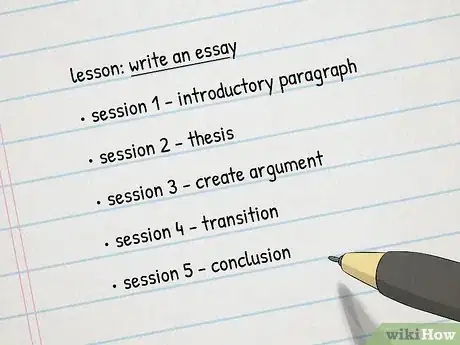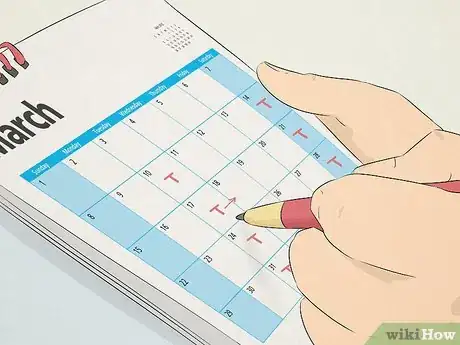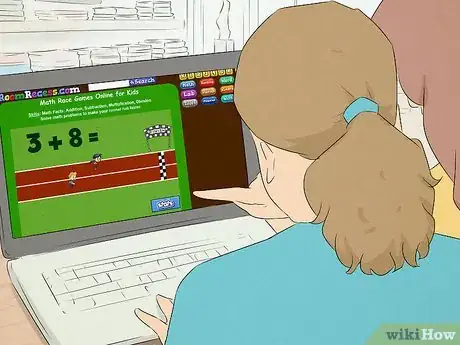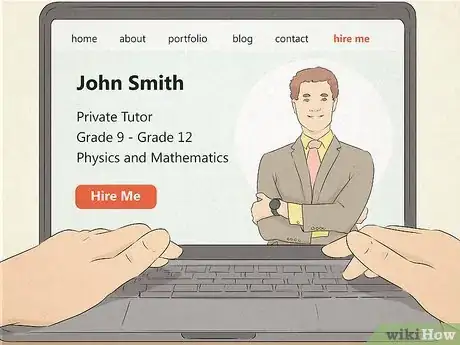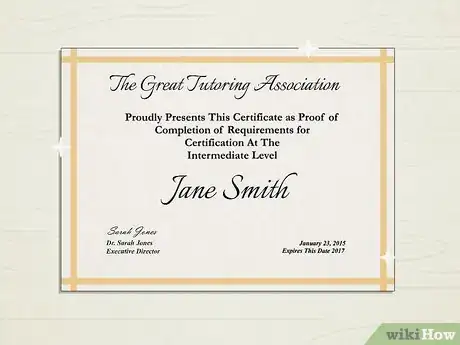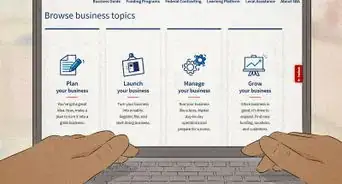This article was co-authored by Ronitte Libedinsky, MS and by wikiHow staff writer, Janice Tieperman. Ronitte Libedinsky is an Academic Tutor and the Founder of Brighter Minds SF, a San Francisco, California based company that provides one-on-one and small group tutoring. Specializing in tutoring mathematics (pre-algebra, algebra I/II, geometry, pre-calculus, calculus) and science (chemistry, biology), Ronitte has over 10 years of experience tutoring to middle school, high school, and college students. She also tutors in SSAT, Terra Nova, HSPT, SAT, and ACT test prep. Ronitte holds a BS in Chemistry from the University of California, Berkeley, and an MS in Chemistry from Tel Aviv University.
There are 11 references cited in this article, which can be found at the bottom of the page.
This article has been viewed 35,161 times.
Starting a tutoring job may seem intimidating, especially since you’re working with people that you’ve never met before. There’s no need to worry, as it’s easy to lead a productive and successful tutoring session with the right preparation. Just remember that tutoring isn’t a race—it’s a journey that you take with your tutee step by step that helps them develop a greater understanding of a certain topic.
Steps
Leading a Productive Session
-
1Prepare for your session in advance if you can. If your student has scheduled a session with you ahead of time, ask the tutee what they’d like to focus on. Look over their assignment sheet before you start so you have a better idea of how to provide assistance.[1]
- If you know the assignment ahead of time, you can start helping the tutee right away during the session.
-
2Arrive at your sessions on time with all of your things. Keep all of your tutoring supplies in 1 spot, like a backpack or tote. Set an alarm or make a note of when your tutoring sessions are so you can arrive a few minutes early.
- Arriving late to a session tells the student that their time isn’t as important as yours.
Advertisement -
3Learn about the background of the student’s assignment. Ask your tutee if they have an assignment sheet or rubric for whatever they’re working on. Go over this sheet with the student so you have a good understanding of what the student needs help with.[2]
- Some students might have a worksheet instead of an official assignment. It’ll likely depend on the specific subject that you’re tutoring.
-
4Establish an overall goal for each tutoring session. Ask the tutee to explain what they’ve been struggling with the most, and try to center the session around that. If you meet with a student regularly, you may be able to make a small lesson plan for future sessions. Decide if you want to focus on a specific assignment, or if your student would prefer to study a specific skill set.[3]
- For example, if a student is struggling with an essay, focus on the introductory paragraph instead of the entire paper.
- If a student is really struggling with algebra, you can walk them through specific skills instead of focusing on a homework assignment.
-
5Listen to the student’s questions and concerns. Give the tutee plenty of opportunities to speak their mind, especially if they have a question. Keep the session focused on the student so you can be as helpful as possible. Don’t dominate the conversation with your own knowledge—instead, offer assistance and advice on an as-needed basis.[4]
- Eye contact is a great way to show that you’re listening to a student.
-
6Ask tutees open-ended questions instead of yes/no questions. Phrase your questions in a way that forces your students to answer and engage with the material. Don’t let your student answer with “yes” or “no,” as these aren’t good indicators of a student’s understanding. Instead, invite the tutee to explain the topic and information to you, which gives them valuable practice.[5]
- Instead of saying “Do you understand this topic?” you can ask something like, “Can you explain how you solve this problem?”
-
7Engage the tutee with questions throughout the session. Don’t assume that the student completely understands a topic. Instead, ask plenty of questions to check in and see how they’re doing. Remind the student that you can always backtrack if a topic seems confusing.
- Get in the habit of checking in with your student every few minutes in the session.
- You can say something encouraging, like: “Is everything making sense so far? It’s totally okay if you want to go over some of these topics again. This subject can be really confusing!”
-
8Think of multiple ways to explain a single concept.[6] Don’t expect all students to learn and understand in the same way. Note that some tutees may be visual learners, while others may prefer to have things explained. Brainstorm different ways to teach a single topic, which helps ensure that your students really understand what’s going on.[7]
- For instance, some students may learn better with a Venn Diagram while others may prefer a bulleted, written list.
- An auditory learner may benefit from a question and answer session, while a visual learner may prefer you to write or draw out different examples.[8]
- A kinesthetic, or hands-on learner, may learn better if you let them pace or walk around throughout the session.
Creating a Friendly and Professional Environment
-
1Greet your tutees before the session starts. Introduce yourself before the beginning of the session and invite the tutee to share their name as well. Offer a friendly greeting and some basic small talk to help the tutee feel a bit more comfortable.
- For instance, you can say something like: “Hi, I’m Jane, and I’ll be your chemistry tutor! What’s your name?” or “Thanks so much for stopping by! How’s your day going?”
-
2Praise your tutees so they feel encouraged. Let your tutee know whenever they do a good job with something. A simple “good job” or “nice work” can go a long way, especially if a student isn’t confident in their own abilities. Try to praise your tutee a lot during each session, even if it’s something small.
- For instance, if your tutee solves a single math problem correctly, tell them that they did a good job.
- Consistent praise helps tutees become more confident in their abilities.
-
3Let your tutee know if you aren’t sure of an answer. Don’t be hard on yourself if you aren’t sure of an exact answer. Instead, be honest and transparent with your student about your own limitations. Use a reference book or quick web search to get the answer to your tutee’s question instead.
- It’s perfectly normal and okay to not have the answers to everything!
- For example, you can say something like: “I don’t know the answer to that off the top of my head, but I can look it up really quickly!”
-
4Relate to the tutee so they don’t feel overwhelmed. Remind the student that they’re not the only person who’s struggled with this topic before. Share a story from when you struggled with a specific topic or lesson. Honesty will only raise your credibility with your tutee, and will help them feel more relaxed and at ease with their assignment.[9]
- For instance, you can say something like: “I completely understand where you’re coming from here. I took a class where I was really confused, and I had to meet with a tutor for extra help.”
-
5Exercise patience if a student doesn’t understand something. Take your tutoring sessions step by step, even if it’s going slower than you may like.[10] Work at the student’s pace if they’re stuck on a single problem, and offer continuous encouragement if they don’t understand something right away.[11]
- If you get frustrated, the student may get discouraged.
- Remember that tutoring is for the student’s gain, and not for your own.
-
6Offer a more flexible schedule that caters to your tutee. Try to make your schedule as open and accommodating as possible. Let your tutees know that you’re happy to work around their schedule, and that your main goal is to help them succeed. Your students may feel more invested in their tutoring sessions if they know that their tutor is willing to help.[12]
- Instead of listing your own hours, ask the student what time slots work well for them. Try to work your tutoring schedule around the student.
Fostering a Tutee’s Independence
-
1Give tutees moments of silence to figure out a problem. Don’t be afraid of awkward silence in your session. Instead, encourage your students to take some time to themselves to figure out a problem. Offer your support on the side, then praise the student for their efforts![13]
- For instance, you can say something like: “I’ll give you a couple minutes to finish up this problem. Let me know if you need any help!”
-
2Work with the student instead of commandeering the assignment. View your tutoring session as a set of training wheels on the bike—you’re helping a student get the hang of an assignment while helping them develop confidence and independence. Don’t solve their problems and do their assignments for them, as this won’t teach your tutees anything. Accept that your sessions are a team effort where you offer support while the student leads the way.[14]
- Some students may expect you to solve a problem for them. In this case, say something like: “Let’s go through an example together so you can solve this problem on your own.”
-
3Center your lessons around your tutee’s interests and learning style.[15] Try to gauge your student’s interests as you begin the session. If your tutee is an athlete, try adding sports metaphors into your session. If the student is a musician, try making some musical connections.
- Students may be more engaged in a session if you use references that they can understand.
- For instance, you can say something like: “The opening sentence of your essay is like the first play in a game of golf. Your sentence kicks off the reader and gets them engaged, while the first play gets viewers invested in the game.”
Establishing a Tutoring Business or Career
-
1Work with a tutoring center if you enjoy working with other people. Look for work with an established tutoring center or university so you can provide consistent help to students. Use this kind of job opportunity to exchange tips and tricks with your fellow tutors so you can improve at your job even more![16]
- Working a tutoring center can be a great job, though you don’t get to choose your own rates.
-
2Start a career as a private tutor if you want better hourly rates. Think about your own experience and flexibility before joining a tutoring center. Private tutoring offers a lot more freedom, and you can set your pricing based on your experience and comfort level. Start with $15 an hour or so if you don’t have a lot of experience. If you’re an advanced tutor with a lot of knowledge to share, you can set your rates anywhere up to $100.[17]
- Look at what other tutors are charging and try to match those rates.
-
3Create a profile on a tutoring website to market yourself. Find a general tutoring website that hosts different profiles. Add your resume to your profile, along with your rates and the subjects you specialize in. Wait for people to view your profile and book you for a tutoring session![18]
- You can also make your own website to advertise yourself as a tutor.
- Some great sites to use are Wyzant, Preply, and Classgap. Some universities also let student tutors upload profiles online.
Tip: Online tutoring is a great, effective way to make money from home. It’s also an incredibly flexible way to work. A lot of private tutors operate through online programs! Many job searching websites post openings for specialized online tutors throughout the year.[19]
-
4Communicate with teachers to give students a specialized learning plan. Talk with your tutee’s teacher to find out what they’ve been struggling with. Work with the teacher to solidify a lesson plan that’ll work well for the student. Try to keep in touch with the student’s teacher frequently, so you can lead a focused session that will really help your tutee.[20]
- For instance, if a student is struggling with subject/verb agreement, you can center your next tutoring session around that.
-
5Get certified as a tutor to set yourself apart from them competition. Visit the National Tutoring Association or The Association for the Tutoring Profession to what certification options are available for you. Keep in mind that these certifications come with a fee of up to $55 that must be paid each year.[21]
- Some organizations require you to submit a professional recommendation before becoming certified.
- These certifications help potential clients know that you’re qualified for the job.
Expert Q&A
-
QuestionWhat are the qualities of a good tutor?
 Ronitte Libedinsky, MSRonitte Libedinsky is an Academic Tutor and the Founder of Brighter Minds SF, a San Francisco, California based company that provides one-on-one and small group tutoring. Specializing in tutoring mathematics (pre-algebra, algebra I/II, geometry, pre-calculus, calculus) and science (chemistry, biology), Ronitte has over 10 years of experience tutoring to middle school, high school, and college students. She also tutors in SSAT, Terra Nova, HSPT, SAT, and ACT test prep. Ronitte holds a BS in Chemistry from the University of California, Berkeley, and an MS in Chemistry from Tel Aviv University.
Ronitte Libedinsky, MSRonitte Libedinsky is an Academic Tutor and the Founder of Brighter Minds SF, a San Francisco, California based company that provides one-on-one and small group tutoring. Specializing in tutoring mathematics (pre-algebra, algebra I/II, geometry, pre-calculus, calculus) and science (chemistry, biology), Ronitte has over 10 years of experience tutoring to middle school, high school, and college students. She also tutors in SSAT, Terra Nova, HSPT, SAT, and ACT test prep. Ronitte holds a BS in Chemistry from the University of California, Berkeley, and an MS in Chemistry from Tel Aviv University.
Academic Tutor A good tutor should be patient and willing to work with students one step at a time until they fully understand the concept they're learning. A tutor should also be flexible. Students learn in different ways, so it's best for a tutor to be able to change up their teaching methods from time to time.
A good tutor should be patient and willing to work with students one step at a time until they fully understand the concept they're learning. A tutor should also be flexible. Students learn in different ways, so it's best for a tutor to be able to change up their teaching methods from time to time. -
QuestionCan you tutor a younger student when you are 12 years old?
 Community AnswerNot officially or in a professional setup, on a professional level. If the other person is a neighbor or a relative who wants to study with your help though, then that's absolutely possible, provided you have the knowledge.
Community AnswerNot officially or in a professional setup, on a professional level. If the other person is a neighbor or a relative who wants to study with your help though, then that's absolutely possible, provided you have the knowledge.
Warnings
- Keep the session focused on academics, and not on you or your student’s personal life.⧼thumbs_response⧽
- Don’t jeer or criticize the instructor for the tutee’s class.⧼thumbs_response⧽
- Always keep a student’s personal information confidential.[22]⧼thumbs_response⧽
References
- ↑ http://www.middlebury.edu/system/files/media/tips_and_strategies_webpage.pdf
- ↑ http://www.middlebury.edu/system/files/media/tips_and_strategies_webpage.pdf
- ↑ http://www.middlebury.edu/system/files/media/tips_and_strategies_webpage.pdf
- ↑ https://www.potsdam.edu/academics/resources/student-success-center/trio/tutoring/10-golden-rules-being-good-tutor
- ↑ https://www.sac.edu/AcademicProgs/ScienceMathHealth/MathCenter/PDF/Tutor%20Training/Module%203/10%20Characteristics%20of%20a%20Good%20Tutor.pdf
- ↑ Ronitte Libedinsky, MS. Academic Tutor. Expert Interview. 26 May 2020.
- ↑ https://www.sac.edu/AcademicProgs/ScienceMathHealth/MathCenter/PDF/Tutor%20Training/Module%203/10%20Characteristics%20of%20a%20Good%20Tutor.pdf
- ↑ https://www.rasmussen.edu/degrees/education/blog/types-of-learning-styles/
- ↑ https://www.potsdam.edu/academics/resources/student-success-center/trio/tutoring/10-golden-rules-being-good-tutor
- ↑ Ronitte Libedinsky, MS. Academic Tutor. Expert Interview. 26 May 2020.
- ↑ https://www.potsdam.edu/academics/resources/student-success-center/trio/tutoring/10-golden-rules-being-good-tutor
- ↑ http://www.middlebury.edu/system/files/media/tips_and_strategies_webpage.pdf
- ↑ https://www.sac.edu/AcademicProgs/ScienceMathHealth/MathCenter/PDF/Tutor%20Training/Module%203/10%20Characteristics%20of%20a%20Good%20Tutor.pdf
- ↑ https://www.potsdam.edu/academics/resources/student-success-center/trio/tutoring/10-golden-rules-being-good-tutor
- ↑ Ronitte Libedinsky, MS. Academic Tutor. Expert Interview. 26 May 2020.
- ↑ https://clc.vcu.edu/staff/opportunities/
- ↑ https://tutorhouse.co.uk/blog/become-a-private-tutor
- ↑ https://www.uky.edu/thestudy/private-tutoring
- ↑ http://www.neotutor.org/2018/03/27/top-6-benefits-of-online-tutoring/
- ↑ https://www.understood.org/en/school-learning/tutors/types-of-tutoring/5-ways-to-help-your-childs-tutor-and-teachers-communicate
- ↑ https://www.hiclark.com/blog/helpful-certifications-for-tutors/
- ↑ https://www.sac.edu/AcademicProgs/ScienceMathHealth/MathCenter/PDF/Tutor%20Training/Module%203/10%20Characteristics%20of%20a%20Good%20Tutor.pdf



